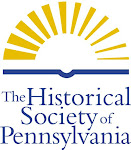I have been sorting through a box of William White Chew's papers that was labeled "Chew Family Papers--Not Processed." Indeed, they are in a total state of disarray.
Here is the box before I started sorting (I started with the one on the right. I can't wait to get to the second box!):

What I'm finding is interesting, and sometimes puzzling. This pile is a collection of notes and lists and random scrawls that were scattered throughout writings on various subjects--from capital punishment to drunkenness.

Some of the more interesting pieces in this pile are:
*a thin strip of paper that simply says "13 Dec. '41. Drowned"
*a list that begins with "Piano; Cow; 2 large mattresses in state room..."
*a strip that reads "I care not to be remembered when I am dead: Those by whom I wd. have wished to be remembd. do not know me--others can not"
*a small folded sheet that reads "In some cases drunkenness is the origin of wickedness: in others, wickedness is the cause of drunkenness along with other vices: --they of the latter [?] the most depraved + incorrigible + hopeless."
next to a sheet with a list of arguments for and against capital punishment (along with several other similar sheets, some with notes about both drunkenness and capital punishment).
It seems that William White Chew was writing both articles and letters to the editor of newspapers, and some of his topics were political (i.e., capital punishment and tariffs) and some were social (i.e., drunkenness).
The notebook at the bottom of the first picture is filled with drafts of poems, essays, and letters. I will be interested to see what emerges from that collection of materials. Until then, I sort through the scraps.














